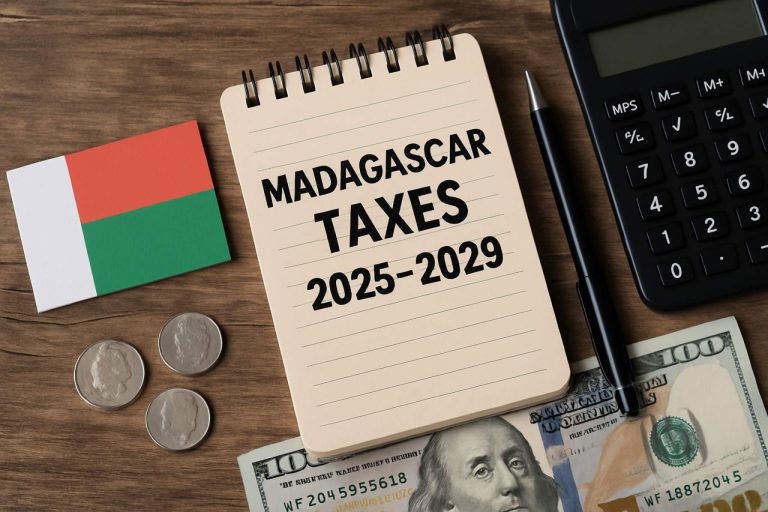
Table of Contents
- Executive Summary: The State of Tax Law in Bolivia (2025)
- Key Regulatory Authorities and Official Sources
- Overview of Current Tax Structure and Main Tax Types
- Recent 2025 Legislative Reforms: What Changed?
- Corporate Taxation: Rules, Rates, and Compliance Essentials
- Personal Income Tax: New Brackets and Reporting Requirements
- VAT and Indirect Taxes: Updates & Sector Impacts
- Tax Compliance, Enforcement, and Digital Filing (SIN Guidance)
- Cross-Border Taxation and Treaties Affecting Bolivia
- Future Outlook: Predicted Reforms and Strategic Considerations (2025–2030)
- Sources & References
Executive Summary: The State of Tax Law in Bolivia (2025)
Bolivia’s tax law framework in 2025 continues to evolve in response to shifting economic, fiscal, and social priorities. The country’s primary tax legislation, the Código Tributario Boliviano (Bolivian Tax Code), remains the cornerstone of the system, with key taxes including the Impuesto al Valor Agregado (IVA, Value Added Tax), Impuesto a las Utilidades de las Empresas (IUE, Corporate Income Tax), and Impuesto a las Transacciones (IT, Transaction Tax). The Servicio de Impuestos Nacionales (SIN) is the principal authority responsible for tax administration and enforcement.
Recent years have witnessed a concerted government effort to modernize tax processes and broaden the tax base. The Servicio de Impuestos Nacionales has implemented digitalization initiatives, such as electronic invoicing (Factura Electrónica), which became mandatory for more taxpayer segments in 2024 and is projected to cover nearly all relevant businesses by 2025. This digital transformation aims to strengthen compliance and reduce tax evasion, which has long posed a challenge.
Compliance rates have shown moderate improvement. According to SIN, tax collection increased by approximately 8% year-on-year in 2023, largely attributed to enhanced enforcement and greater taxpayer registration. The overall tax-to-GDP ratio stood at about 23% in 2023, reflecting a steady recovery from pandemic-related lows. However, informal economic activity remains significant, accounting for an estimated 60% of the workforce and presenting persistent compliance challenges.
In terms of legislative developments, the Bolivian government has signaled intentions to further refine tax regulations to align with international standards on transparency and anti-evasion. These include stricter transfer pricing rules and enhanced cooperation with global tax authorities, partly in response to commitments under the OECD/G20 Inclusive Framework on BEPS (Base Erosion and Profit Shifting), to which Bolivia is a participant. The government also continues to adjust special regimes for small and medium enterprises (Regimen Simplificado) to promote formalization and ease compliance burdens.
Looking ahead to 2025 and the next few years, the outlook for tax law in Bolivia centers on ongoing modernization, with increased automation, improved taxpayer services, and the use of data analytics for enforcement. The SIN’s strategic plan for 2023–2027 prioritizes digital transformation, combating informality, and enhancing tax education. While fiscal pressures remain—driven by social spending and infrastructure needs—Bolivia’s sustained commitment to tax system reforms suggests incremental improvements in compliance and revenue mobilization, though challenges related to informality and administrative capacity are likely to persist.
Key Regulatory Authorities and Official Sources
Bolivia’s tax law framework is shaped and enforced by a network of regulatory authorities and official bodies, tasked with tax policy formulation, administration, enforcement, and dispute resolution. These institutions are pivotal for taxpayers’ compliance and for interpreting the evolution of tax regulations. As of 2025, the following are the primary regulatory authorities and reliable official sources for information, compliance, and policy in Bolivian tax law:
- Servicio de Impuestos Nacionales (SIN): The Servicio de Impuestos Nacionales is Bolivia’s central tax authority responsible for the administration, collection, and enforcement of national taxes, including value-added tax (IVA), corporate income tax (IUE), and transaction tax (IT). SIN provides official resolutions, taxpayer guidance, compliance instructions, online filing platforms, and statistical bulletins on tax collections and audits. Taxpayers and professionals can access up-to-date legal texts, regulatory changes, and procedural manuals directly through the Servicio de Impuestos Nacionales.
- Ministerio de Economía y Finanzas Públicas: The Ministry of Economy and Public Finance is responsible for national fiscal policy, legislative proposals related to taxation, and macroeconomic planning. It works in coordination with SIN to draft, amend, and implement tax laws and to issue fiscal policy statements and economic statistics. Updated tax regulations and official communications can be found through the Ministerio de Economía y Finanzas Públicas.
- Autoridad de Impugnación Tributaria (AIT): The Tax Appeals Authority acts as the main administrative tribunal for resolving disputes between taxpayers and the tax administration. Its role includes issuing binding resolutions, providing access to case law, and publishing interpretive criteria relevant to tax controversies. Official decisions and guidance are accessible via the Autoridad de Impugnación Tributaria.
- Tribunal Supremo de Justicia: In cases requiring judicial review, Bolivia’s Supreme Court is the final arbiter for constitutional and legal matters, including tax disputes escalated from administrative channels. Supreme Court jurisprudence on tax law is available through the Tribunal Supremo de Justicia.
For the most current information on tax legislation, compliance requirements, and authoritative rulings in Bolivia, stakeholders should consult these official sources regularly. These entities will remain central to tax law administration and reform as Bolivia continues to adapt its fiscal framework in 2025 and beyond.
Overview of Current Tax Structure and Main Tax Types
Bolivia’s tax system is governed by the Código Tributario Boliviano (Bolivian Tax Code), overseen by the Servicio de Impuestos Nacionales (SIN, National Tax Service). The current structure comprises national, departmental, and municipal taxes, with the principal revenue streams derived from value-added tax (IVA), corporate income tax (IUE), and transaction tax (IT).
- Value Added Tax (IVA): The standard IVA rate is 13%, imposed on the sale of goods, provision of services, and imports. Certain essential goods and exports are exempt. IVA is the cornerstone of indirect taxation and a major source of revenue. Compliance with monthly filing is mandatory for registered taxpayers (Servicio de Impuestos Nacionales).
- Corporate Income Tax (IUE): The IUE applies at a 25% rate to companies and legal entities on their annual net profits. Financial institutions and hydrocarbon sector companies face higher rates of 37.5% and 50%, respectively. The IUE is calculated on the basis of profit declared in annual financial statements, with an obligation to file within 120 days after fiscal year-end (Servicio de Impuestos Nacionales).
- Transaction Tax (IT): IT is a 3% tax levied on gross income from commercial, industrial, and service activities, acting as a minimum tax (with the possibility to credit IT payments against IVA or IUE liabilities). It is payable monthly (Servicio de Impuestos Nacionales).
- Other National Taxes: These include the Specific Consumption Tax (ICE) on luxury goods, vehicles, and tobacco, and the Tax on Large Fortunes (IGF), which targets individuals with assets exceeding BOB 30 million (about USD 4.3 million), introduced in 2021 and continuing in force (Servicio de Impuestos Nacionales).
- Subnational Taxes: Municipalities levy real estate tax (Impuesto a la Propiedad de Bienes Inmuebles, IPBI), vehicle tax, and the municipal patent for commercial activities. Departments also administer transfer taxes on vehicles and property (Gobierno Autónomo Municipal de La Paz).
Recent reforms have focused on digitalization of tax administration, with the SIN expanding online filing and electronic invoicing in 2023-2025. For 2025 and beyond, the government emphasizes compliance, automation, and broadening the tax base to improve collection, with total national tax revenue in 2023 reaching BOB 41.5 billion (approx. USD 6 billion) (Servicio de Impuestos Nacionales). Continued modernization and increased scrutiny on large taxpayers are expected in the coming years.
Recent 2025 Legislative Reforms: What Changed?
Bolivia’s tax law landscape has experienced significant changes entering 2025, reflecting the government’s efforts to modernize and enhance fiscal compliance. The most notable reform is the implementation of new electronic invoicing requirements nationwide, aiming to increase transparency and reduce tax evasion. As of January 2025, all medium and large taxpayers are mandated to use the Sistema de Facturación Electrónica (SFE), a development overseen by the Servicio de Impuestos Nacionales (SIN). This transition is expected to improve tax collection efficiency by enabling real-time monitoring of commercial transactions.
Additionally, the government has updated the General Law of Taxation (Ley 2492) to strengthen anti-avoidance provisions. The amendments provide tax authorities with broader powers to challenge artificial arrangements lacking economic substance. Key compliance thresholds triggering mandatory audits have been lowered, especially for sectors flagged as high-risk for tax evasion, such as mining, hydrocarbons, and large-scale retail. These changes were formalized through Supreme Decree No. 4873, published in late 2024, and are now fully in force.
The corporate income tax (Impuesto sobre las Utilidades de las Empresas, IUE) rate remains at 25%, but 2025 reforms introduced stricter documentation rules for deducting expenses and applying tax incentives. Companies must now submit annual electronic reports with detailed breakdowns of deductible expenses, and the SIN has intensified scrutiny of cross-border transactions to prevent transfer pricing abuses. The Value Added Tax (Impuesto al Valor Agregado, IVA) regime has also seen procedural adjustments, including new digital platforms for monthly filings and faster processing of VAT refunds for exporters.
On the compliance front, the SIN has ramped up enforcement, conducting over 8,000 targeted audits in 2024—a 25% increase from the previous year. Early data for 2025 indicate this trend will continue, with particular focus on digital economy businesses and foreign-owned entities. According to official statistics, tax revenues rose by 12% year-on-year in 2024, surpassing 70 billion Bolivianos, and authorities project continued growth as the electronic controls mature.
Looking ahead, the Bolivian government has signaled further digitalization and harmonization with international tax standards, especially regarding exchange of information and anti-money laundering measures. Businesses are advised to prioritize compliance with the new electronic systems and maintain robust documentation to withstand heightened scrutiny in the coming years.
Corporate Taxation: Rules, Rates, and Compliance Essentials
Bolivia’s corporate tax framework is primarily governed by the “Impuesto sobre las Utilidades de las Empresas” (IUE), or Corporate Income Tax. The standard IUE rate remains at 25% of net taxable profits for most entities, with higher rates of 37.5% applicable to financial institutions and 50% for mining operations under certain circumstances. The tax year generally coincides with the company’s annual accounting period, and returns must be filed within 120 days of fiscal year-end. Advance payments are required on a quarterly basis, calculated as a portion of the prior year’s tax liability (Servicio de Impuestos Nacionales).
Several notable developments are shaping the corporate tax landscape as Bolivia enters 2025. The government has intensified digitalization of tax administration, mandating electronic invoicing (Factura Digital) for most large and medium taxpayers. This move aims to improve compliance, reduce evasion, and streamline audit processes. Noncompliance with e-invoicing requirements can result in substantial administrative penalties and, in severe cases, temporary closure of business premises. Additionally, the tax authority continues to expand its auditing focus on transfer pricing for related-party transactions, particularly in sectors such as hydrocarbons and mining (Servicio de Impuestos Nacionales).
Key compliance obligations for corporations in Bolivia include:
- Annual filing of the IUE return and related financial statements within the stipulated deadline.
- Quarterly advance tax payments based on the previous year’s liability.
- Retention and remittance of VAT (13%) and the Transaction Tax (IT, at 3%) on qualifying transactions.
- Strict documentation for transfer pricing, with penalties for failure to comply.
- Electronic invoicing and maintenance of digital tax records.
Statistics from the Servicio de Impuestos Nacionales indicate a steady increase in corporate tax collections, attributed to the expansion of the e-invoicing regime and enhanced audit initiatives. In 2023, corporate tax revenues rose by approximately 12%, with projections for 2025 anticipating continued growth as compliance measures tighten and digital oversight broadens.
Looking forward, the Bolivian government is expected to maintain its focus on digital transformation of tax administration, with potential legislative updates to strengthen anti-avoidance provisions and align with international tax standards. Businesses operating in Bolivia should closely monitor regulatory changes, prioritize robust compliance systems, and ensure timely fulfillment of all tax obligations to avoid increasing scrutiny and penalties in the evolving tax environment.
Personal Income Tax: New Brackets and Reporting Requirements
Bolivia’s personal income tax regime has undergone notable changes as part of the government’s ongoing efforts to modernize and enhance fiscal compliance. The Impuesto a las Utilidades de las Personas (IUP), Bolivia’s principal personal income tax, remains a key component of the national tax framework. In 2025, the Bolivian government introduced new tax brackets and strengthened reporting requirements to address structural inefficiencies and improve revenue collection.
As of January 2025, the Servicio de Impuestos Nacionales (SIN) implemented a revised progressive tax schedule for individuals. The new brackets are designed to increase the tax burden on higher-income earners while providing relief for those with lower annual incomes. The updated brackets are as follows:
- 0% for annual income up to BOB 48,000
- 13% for annual income from BOB 48,001 to BOB 120,000
- 20% for annual income from BOB 120,001 to BOB 240,000
- 25% for annual income above BOB 240,000
Additionally, the SIN has mandated stricter annual reporting requirements for individuals. All taxpayers earning above BOB 48,000 annually must file an electronic tax declaration by March 31 of the following year. The reporting process now requires detailed disclosure of domestic and foreign income sources, as well as supporting documentation for deductions and exemptions. These measures are intended to combat tax evasion and improve transparency, in line with recommendations from the Autoridad de Impugnación Tributaria and international fiscal standards.
According to SIN statistics, the number of personal income tax filers increased by 12% between 2023 and 2024, attributed to enhanced digital systems and outreach campaigns. Tax authorities anticipate a further 8–10% rise in individual compliance rates during 2025, as the new brackets and reporting obligations come into effect. The government projects that these reforms will augment personal income tax revenues by approximately 15% year-on-year.
Looking ahead, Bolivian tax authorities are expected to continue refining the personal income tax system. Planned initiatives include the expansion of digital taxpayer services and increased data-sharing with financial institutions to detect unreported income. These developments underscore Bolivia’s commitment to modernizing its tax administration and aligning with regional best practices through 2026 and beyond (Servicio de Impuestos Nacionales).
VAT and Indirect Taxes: Updates & Sector Impacts
Bolivia’s value-added tax (VAT), known locally as “Impuesto al Valor Agregado” (IVA), remains a central component of the country’s tax framework, with substantial implications for businesses and consumers across various sectors. As of 2025, the standard VAT rate continues at 13%, applicable to the sale of goods, provision of services, and imports. The Bolivian tax authority, Servicio de Impuestos Nacionales (SIN), oversees VAT administration, compliance, and enforcement.
Recent years have seen incremental reforms and digitalization efforts. In 2023–2024, the SIN expanded its “Factura Electrónica” system, mandating electronic invoicing for a growing number of taxpayers, aiming for sector-wide coverage by 2025. This move streamlines tax reporting, reduces evasion, and improves data integrity. Businesses in wholesale, retail, professional services, and construction are among those now subject to mandatory e-invoicing, with phased deadlines according to sector and company size. The SIN has published updated lists of obligated taxpayers and technical guidelines for compliance (Servicio de Impuestos Nacionales).
Key sector impacts of VAT and related indirect taxes include:
- Manufacturing and Imports: VAT applies to most imports, increasing landed costs. Manufacturers must manage VAT credits and debits effectively, a process now closely monitored via electronic invoicing.
- Mining and Natural Resources: Exported minerals are generally zero-rated for VAT, but companies must meet strict documentation requirements to claim input VAT credits.
- SMEs: Small and medium enterprises face compliance burdens, though simplified regimes exist for micro-enterprises and small taxpayers. The SIN offers targeted training and online tools (Servicio de Impuestos Nacionales).
Recent statistics from the SIN indicate that VAT collections represented approximately 33% of total national tax revenue in 2023, highlighting the tax’s fiscal importance (Servicio de Impuestos Nacionales). Ongoing compliance campaigns target underreporting and non-issuance of invoices, with increased audits and penalties for non-compliance.
Looking ahead, the Bolivian government has signaled further modernization of indirect tax administration, including enhanced data analytics and broader digitalization. While no major rate changes are announced for 2025, continued expansion of electronic controls and enforcement efforts are expected, with a focus on closing VAT gaps and supporting public finance sustainability.
Tax Compliance, Enforcement, and Digital Filing (SIN Guidance)
Bolivia’s tax compliance and enforcement landscape is shaped by the policies and technological initiatives of the Servicio de Impuestos Nacionales (SIN), the country’s principal tax authority. The SIN has accelerated the digitalization of its processes in recent years, aiming to increase efficiency, transparency, and taxpayer adherence. As of 2025, electronic filing (Sistema Integrado de la Administración Tributaria, SIAT) is mandatory for most medium and large enterprises, with ongoing efforts to expand digital compliance to micro and small businesses.
The SIN’s digital systems now cover core taxes such as the Value Added Tax (IVA), Corporate Income Tax (IUE), and the Transaction Tax (IT), allowing returns, payments, and documentation to be managed online. In 2024, the SIN reported that over 85% of tax declarations were filed electronically, a significant increase from previous years, reflecting both regulatory pushes and improved taxpayer services. The SIN’s online portal provides step-by-step guidance, video tutorials, and live support to facilitate compliance, particularly for new digital filers (Servicio de Impuestos Nacionales).
Tax compliance enforcement has also intensified. The SIN employs data analytics and cross-referencing of digital records to identify inconsistencies and potential cases of evasion. In 2023 and 2024, the SIN conducted thousands of audits, with a focus on sectors with historically low compliance, such as construction, retail, and informal services. Penalties for late or incorrect filings remain strict, typically including fines and interest, and the SIN has increased public awareness campaigns about these sanctions.
One significant legislative development is the gradual introduction of electronic invoicing (Factura Electrónica). By 2025, this system is mandatory for specified high-turnover sectors and voluntary for others, with expansion expected. The SIN provides detailed technical specifications and phased implementation calendars to help businesses transition smoothly (SIAT – Servicio de Impuestos Nacionales).
- Electronic filing rate exceeds 85% for major taxes.
- Targeted audits and digital cross-checks are standard practice.
- Penalties for non-compliance include fines and suspension of tax certificates.
- Electronic invoicing is expanding sector by sector.
Looking ahead, Bolivian authorities are committed to further digitalization and stricter enforcement, aiming for near-universal digital compliance by 2027. Businesses must adapt to evolving requirements, stay updated with SIN communications, and leverage available digital resources to ensure ongoing compliance under Bolivian tax law.
Cross-Border Taxation and Treaties Affecting Bolivia
Bolivia’s cross-border tax regime is shaped by domestic legislation and a relatively limited network of tax treaties. As of 2025, Bolivia continues to rely primarily on its internal tax laws to regulate the taxation of foreign-sourced income and the treatment of non-residents, with only a handful of double taxation agreements (DTAs) in force. The prospect of greater international tax cooperation, however, is growing as the government seeks to align with global standards and attract foreign investment.
Bolivia taxes residents on their worldwide income and non-residents on Bolivian-sourced income. The standard corporate income tax (Impuesto sobre las Utilidades de las Empresas, IUE) rate is 25%, with an additional 12.5% for certain extractive industries. Non-resident companies are generally subject to a 12.5% withholding tax on Bolivian-source income, including dividends, interest, royalties, and technical service fees. These rates may be reduced under a tax treaty, but Bolivia has signed only a few such agreements, notably with Argentina, Germany, and the Andean Community (CAN) countries, which provide for relief on double taxation and administrative cooperation (Servicio de Impuestos Nacionales).
The limited treaty network means that most cross-border payments to or from Bolivia are fully taxable unless specifically exempted. For example, payments to residents of non-treaty countries are generally subject to the full statutory withholding rates. The treaties with Argentina and Germany, as well as the CAN agreement, provide for reduced rates on interest, royalties, and dividends, and mechanisms to avoid double taxation. However, Bolivia is not yet a signatory to the OECD Multilateral Instrument (MLI) or the Common Reporting Standard (CRS), although discussions on joining these frameworks are ongoing as part of broader efforts to combat tax evasion and improve transparency (Autoridad de Impugnación Tributaria).
Compliance with cross-border tax obligations is overseen by the Servicio de Impuestos Nacionales (SIN), which has intensified scrutiny of transfer pricing and related-party transactions in recent years. Transfer pricing regulations require documentation supporting the arm’s length nature of transactions with foreign affiliates, and failure to comply may result in significant penalties (Servicio de Impuestos Nacionales).
Looking ahead, Bolivia is expected to continue strengthening its cross-border tax compliance regime, expand its treaty network, and possibly participate in international initiatives against base erosion and profit shifting (BEPS). These developments are likely to enhance legal certainty for cross-border investors while increasing the compliance burden for multinational enterprises operating in Bolivia.
Future Outlook: Predicted Reforms and Strategic Considerations (2025–2030)
Bolivia’s tax law landscape is poised for significant evolution between 2025 and 2030, with both domestic priorities and international pressures shaping the policy agenda. The country’s tax system, primarily governed by the Código Tributario Boliviano and administered by the Servicio de Impuestos Nacionales (SIN), has in recent years focused on combating evasion, enhancing digitalization, and improving collection efficiency. These priorities are expected to intensify as Bolivia seeks to bolster fiscal revenues and finance social programs amid economic headwinds.
The 2025–2030 period is likely to witness reforms aimed at broadening the tax base and tightening compliance. The government has signaled intentions to update the value added tax (VAT) structure, review corporate tax incentives, and further digitalize tax administration. Ongoing efforts to integrate electronic invoicing across all sectors—already mandatory for large taxpayers—are anticipated to expand, reducing informality and closing revenue gaps. The Servicio de Impuestos Nacionales (SIN) has confirmed plans to enhance its digital tools and taxpayer support systems, which will likely improve compliance rates and transparency.
Bolivia continues to maintain a corporate income tax (Impuesto sobre las Utilidades de las Empresas, IUE) rate of 25%, with additional surcharges for certain sectors, especially hydrocarbons and mining. While no formal announcements have been made regarding imminent rate changes, fiscal sustainability concerns and regional tax competition could prompt adjustments or the introduction of new sector-specific levies. Internationally, Bolivia faces increasing pressure to align with global standards on tax transparency and anti-avoidance measures. The country is a participant in the Inclusive Framework on BEPS, coordinated by the Organisation for Economic Co-operation and Development (OECD), and efforts to adopt minimum standards on exchange of information and transfer pricing documentation are expected to accelerate.
Key compliance statistics highlight both challenges and progress. According to the Servicio de Impuestos Nacionales (SIN), the national tax revenue increased by approximately 8.2% in 2023, driven by improved enforcement and digitalization. However, the informal sector remains substantial, accounting for an estimated 60% of economic activity, underscoring the need for persistent reform efforts through 2030.
Strategically, multinational enterprises and domestic businesses should prepare for greater scrutiny of cross-border transactions, expanded reporting obligations, and potentially higher penalties for non-compliance. Taxpayers are advised to monitor regulatory updates closely, invest in robust compliance systems, and engage proactively with evolving electronic reporting requirements.



